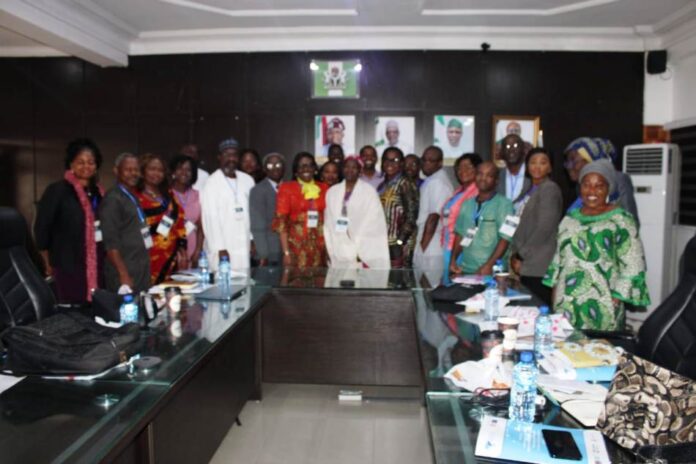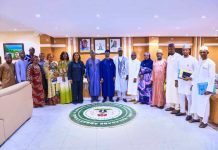
The Federal Government of Nigeria, in partnership with international collaborators and research institutions, has officially concluded the Global Evidence, Local Adaptation (GELA) project, an ambitious three-year initiative designed to improve newborn and child health by developing and adapting evidence-informed clinical guidelines that reflect both global standards and local healthcare realities.
Project aims to bridge global evidence with local realities for sustainable, high-impact healthcare delivery in Nigeria
The ceremony (tagged “End of Project Dissemination Meeting Programme”) held in the Federal Ministry of Health & Social Welfare Headquarters Abuja, brought together key stakeholders from the Ministry, Cochrane Nigeria, international experts, academia, and professional bodies like the Paediatric Association of Nigeria.
Speaking during the meeting, Dr. Amina Director of the Child Health Division, who represented the Director Family Health Department, emphasized the Ministry’s full support for the GELA initiative and reaffirmed the government’s commitment to using science and collaboration to reduce mortality and improve healthcare outcomes for vulnerable populations.
She was joined by Dr. Gbenga Ijaodole, Deputy Director of Research and Knowledge Management, who noted that the project aligns strongly with Nigeria’s health vision of saving lives, reducing pain, and enhancing healthcare delivery, especially at the primary level. Dr. Gbenga Ijaodole represented the Director Health Planning Research Statistics Department FMoHSW, Dr. Kamil Shoretire.
The GELA project, which officially launched in April 2022 and concluded in August 2025 after a brief extension, was implemented in three sub-Saharan African countries, Nigeria, Malawi, and South Africa, with Nigeria serving as a critical implementation site led by Cochrane Nigeria, headquartered in Cross River State. The project was funded by the European & Developing Countries Clinical Trials Partnership (EDCTP2), although the funders had no influence over project design or execution.
According to Professor Martin Meremikwu, Director of Cochrane Nigeria, the project was significant in its dual emphasis: generating high-quality, context-specific guidelines and building local capacity for evidence synthesis and adaptation.
“The GELA project shows that while global science exists, it must be critically evaluated and adapted to local contexts. We moved away from simply adopting international guidelines to a structured, evidence-informed process of adapting or developing new ones suited for Nigeria,” he said.
With strong institutional support from the Federal Ministry of Health’s Family Health and Health Planning, Research, and Statistics Departments; stakeholders expressed optimism that the GELA initiative will not end with the project’s formal closure. “Today is the end of a project, but it is the beginning of a new chapter in Nigeria’s evidence-based healthcare journey,” Prof. Meremikwu added.
Through a six-stage process- engage, synthesize, decide, share, learn, and evaluate, the project convened national stakeholders to identify priority health issues, conduct systematic reviews, and guide the development of clinical guidelines. Over 27 sub-topics were initially identified, with areas like preeclampsia management marked for future work due to complexity in evidence synthesis.
Dr. Moriam Chibuzor, Senior Scientist on the GELA project, and Dr. Dachi Arikpo, a health economist on the team, presented insights on how stakeholder engagement, evidence mapping, and interactive reviews formed the backbone of the initiative. They highlighted that beyond guidelines, the project created a model for policy-research collaboration, which could inform future national health strategies.
According to Dr. Chibuzor, the final outputs are expected to influence Nigeria’s contributions to the WHO guideline program while enabling improved service delivery at all levels of care.
A key highlight was the active role of the Paediatric Association of Nigeria, whose President attended the session, underscoring the project’s clinical relevance.
Speaking at the event, Professor Ekanem Ekure, President of the Paediatric Association of Nigeria (PAN), commended the Federal Ministry of Health and Social Welfare, especially the Child Health Division and Department of Family Health, for their unwavering partnership throughout the life of the project.
“We’ve worked closely together for quite a while, and I truly commend the Child Health Division and the Family Health Department for the deep collaboration we’ve had,” she said. “The past three years have been marked by remarkable progress and meaningful cooperation.”
Prof. Ekure, also representing the Atlantic Astronomy Bureau, expressed pride in the project’s two major guideline achievements: Improving hand hygiene and infection prevention and control (IPC) among healthcare workers, youth, and the public. and, Advancing low-birth-weight and preterm care, aimed at saving newborn lives and improving health outcomes.
The successful completion of GELA reinforces Nigeria’s resolve to invest in cost-effective, high-quality, and contextually appropriate healthcare interventions, especially for children and newborns, toward achieving Universal Health Coverage (UHC) and reducing preventable deaths.
Meeting Objectives include:
-To formally update relevant departments in the FMoHSW on the guideline development processes and outcomes of the GELA Project
-To present the Finalized Guideline (Draft copies) recommendations, infographics and, interactive electronic formats on Magic App to stakeholders at the meeting
-To discuss dissemination approaches to promote uptake of the guideline recommendations with stakeholders
Signed
Alaba Balogun
Information & Public Relations
2 August 2025





